Synopsis
Act 1
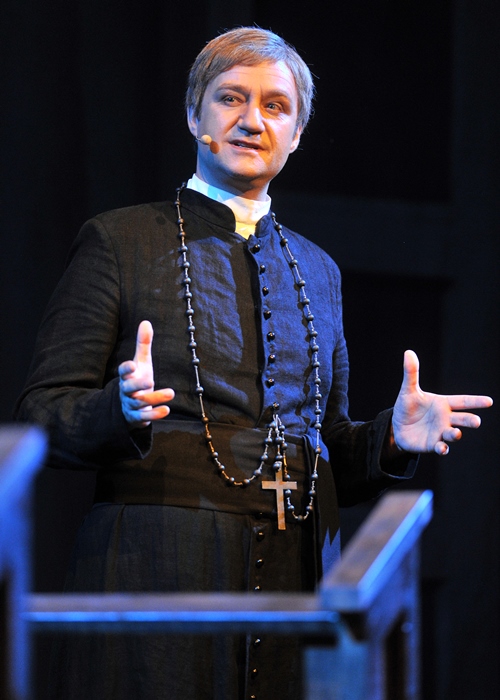 Germany in the 19th century – the era of industrialisation and social upheaval. Late in life, Adolph Kolping remembers the origins of his dream; a dream that became his life...
Germany in the 19th century – the era of industrialisation and social upheaval. Late in life, Adolph Kolping remembers the origins of his dream; a dream that became his life...
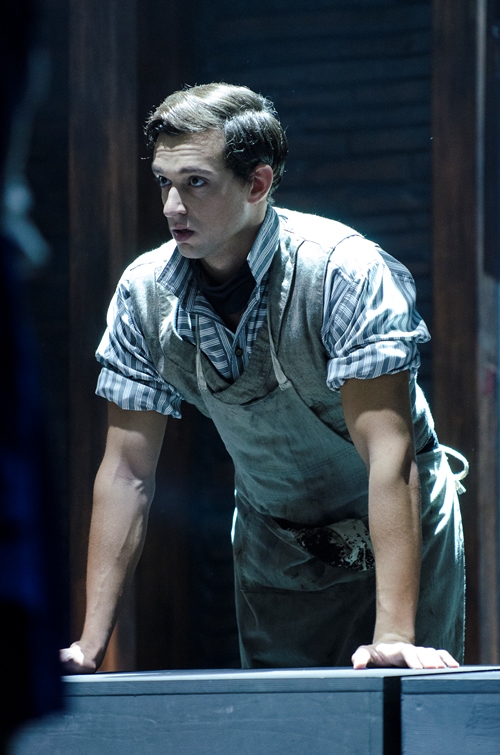 The musical starts with a traditional scene: in a shoemaker’s workshop in Kerpen a young journeyman is dissatisfied with his limited existence and, with the encouragement of the village chaplain, decides to leave and work as a travelling craftsman. After a tussle with other journeymen in a country pub who take the mickey out of the high-brow bookworm, Kolping decides to continue onto Cologne with the fun-loving craftsman, Karl Wagner.
The musical starts with a traditional scene: in a shoemaker’s workshop in Kerpen a young journeyman is dissatisfied with his limited existence and, with the encouragement of the village chaplain, decides to leave and work as a travelling craftsman. After a tussle with other journeymen in a country pub who take the mickey out of the high-brow bookworm, Kolping decides to continue onto Cologne with the fun-loving craftsman, Karl Wagner.
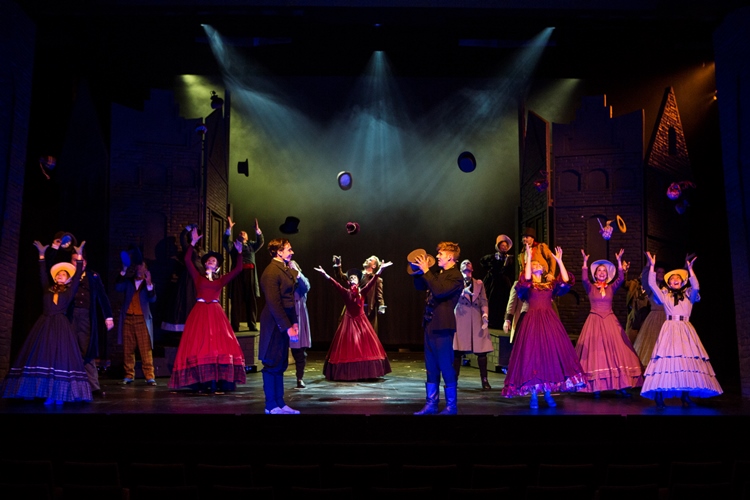 When they arrive in Cologne they are fascinated by the opportunities offered by a large city. Karl revels in the fast city life with all its allures and finds work in Karcher’s steel factory. Karl flirts with Susanne, Beck the shoemaker’s daughter, and through this contact Adolph Kolping finds employment at the shoemaker’s workshop.
When they arrive in Cologne they are fascinated by the opportunities offered by a large city. Karl revels in the fast city life with all its allures and finds work in Karcher’s steel factory. Karl flirts with Susanne, Beck the shoemaker’s daughter, and through this contact Adolph Kolping finds employment at the shoemaker’s workshop.
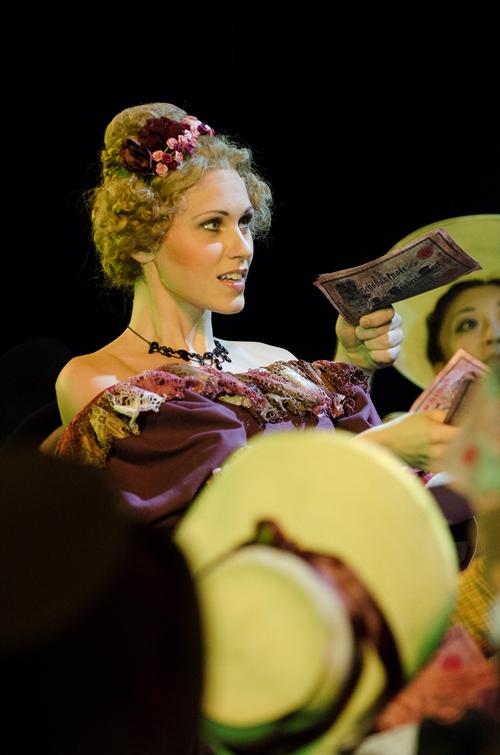 After some time Beck wants to entrust Kolping not only with his workshop, but also his daughter, however things take a different turn: Susanne is pregnant with Karl’s child and Karl successfully requests her hand in marriage as he can provide the security of being a foreman. At the same time he arranges a job for Kolping with the factory owner’s sick wife, Frieda Karcher, who needs someone to read to her. In this way Kolping can fulfil a long-held wish: at the age of 24 Kolping goes back to school and completes his “Abitur” three and a half years later.
After some time Beck wants to entrust Kolping not only with his workshop, but also his daughter, however things take a different turn: Susanne is pregnant with Karl’s child and Karl successfully requests her hand in marriage as he can provide the security of being a foreman. At the same time he arranges a job for Kolping with the factory owner’s sick wife, Frieda Karcher, who needs someone to read to her. In this way Kolping can fulfil a long-held wish: at the age of 24 Kolping goes back to school and completes his “Abitur” three and a half years later.
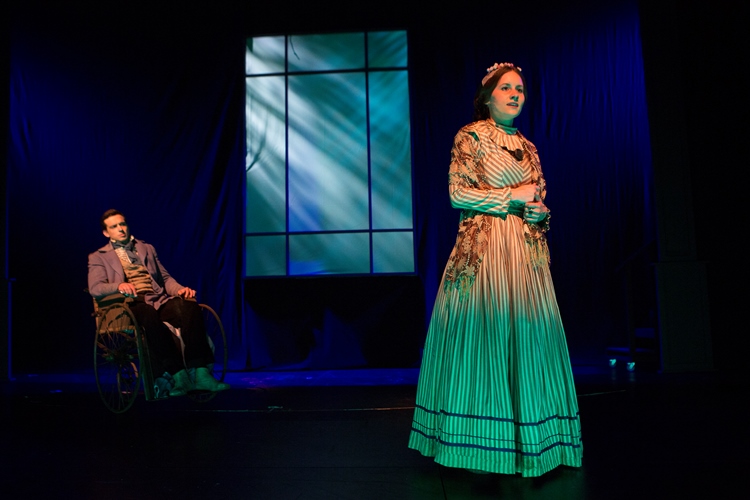 Kolping develops a trusting relationship to Frieda Karcher. She encourages the young man to follow his goal of becoming a priest even when the obstacles seem unsurmountable. She herself feels that she has been cheated of her happiness, because, being the only heir, she agreed to her father’s wedding plans without any resistance and thus she unconditionally surrendered herself to her selfish, ill-tempered husband.
Kolping develops a trusting relationship to Frieda Karcher. She encourages the young man to follow his goal of becoming a priest even when the obstacles seem unsurmountable. She herself feels that she has been cheated of her happiness, because, being the only heir, she agreed to her father’s wedding plans without any resistance and thus she unconditionally surrendered herself to her selfish, ill-tempered husband.
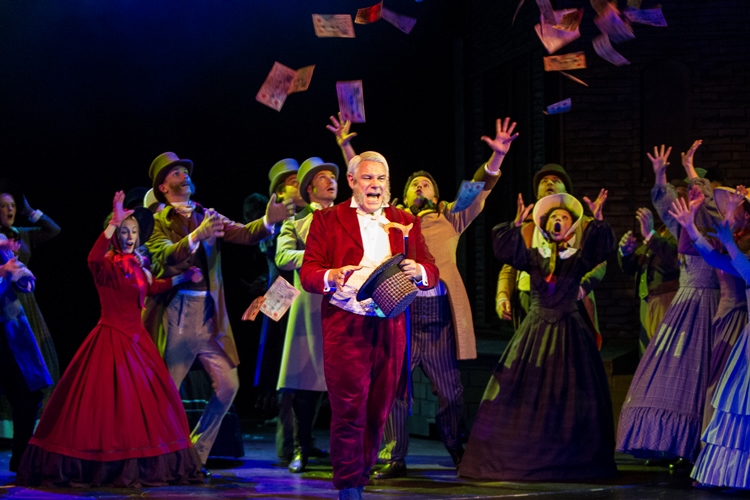 Things take a turn for the worse for Kolping’s friend, Karl. The work conditions in the factories have drastically deteriorated and the workers are mercilessly exploited. As Karl opposes Karcher, the factory owner, he is humiliated by him and finally dismissed – a hard blow for a young family father.
Things take a turn for the worse for Kolping’s friend, Karl. The work conditions in the factories have drastically deteriorated and the workers are mercilessly exploited. As Karl opposes Karcher, the factory owner, he is humiliated by him and finally dismissed – a hard blow for a young family father.
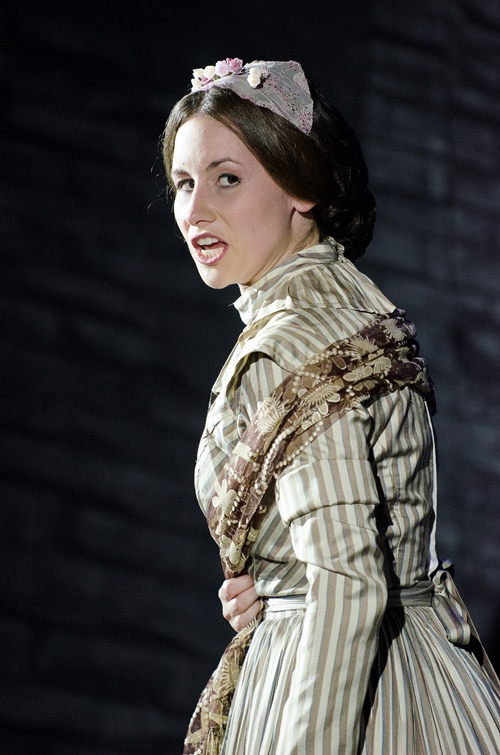 When Frieda Karcher dies, Kolping stands on the brink of financial collapse for a time as he has been reliant on the earnings he received as a reader, but the industrialist’s wife has left him a large inheritance which allows him to start his studies for the priesthood in Munich.
When Frieda Karcher dies, Kolping stands on the brink of financial collapse for a time as he has been reliant on the earnings he received as a reader, but the industrialist’s wife has left him a large inheritance which allows him to start his studies for the priesthood in Munich.
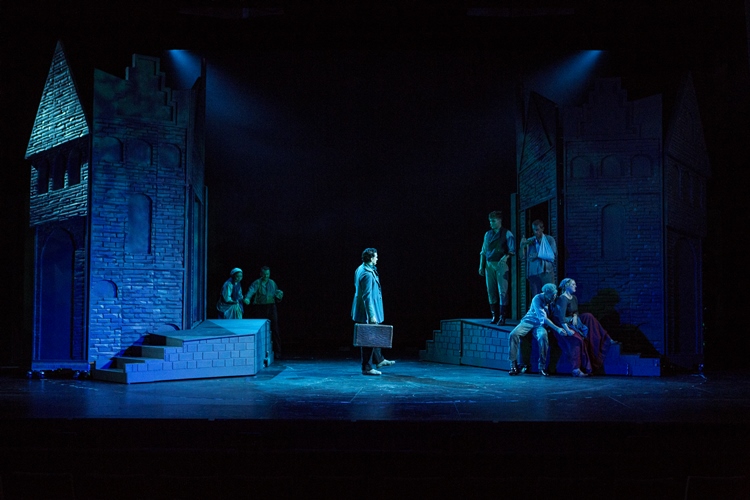 When Kolping looks for Karl in the streets of Cologne in order to say goodbye to him, he finds him drunk. Kolping accuses him of acting irresponsibly towards his family and a bitter argument ensues. Karl counters the accusations by accusing Kolping of being out of touch with reality.
When Kolping looks for Karl in the streets of Cologne in order to say goodbye to him, he finds him drunk. Kolping accuses him of acting irresponsibly towards his family and a bitter argument ensues. Karl counters the accusations by accusing Kolping of being out of touch with reality.
Act 2
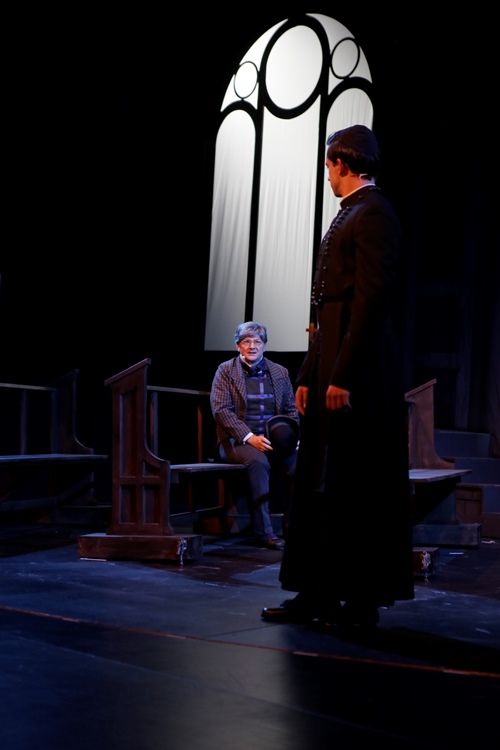 In St. Laurentius‘ Church in Elberfeld Adolph Kolping takes on his first position as a chaplain, but his idealism soon comes up against the reality. The church services are badly attended and no-one seems to be interested in what the committed priest is saying and this causes Kolping to doubt himself. Only after speaking to Breuer, the local teacher, does he realise what the real issue is. Breuer points out the pitiful living conditions of the industrial workers, who are being crushed in the cogs of progress in the modern factories in Elberfeld. Breuer tells Kolping about the journeymen’s club model and how he has founded such a club in Elberfeld.
In St. Laurentius‘ Church in Elberfeld Adolph Kolping takes on his first position as a chaplain, but his idealism soon comes up against the reality. The church services are badly attended and no-one seems to be interested in what the committed priest is saying and this causes Kolping to doubt himself. Only after speaking to Breuer, the local teacher, does he realise what the real issue is. Breuer points out the pitiful living conditions of the industrial workers, who are being crushed in the cogs of progress in the modern factories in Elberfeld. Breuer tells Kolping about the journeymen’s club model and how he has founded such a club in Elberfeld.
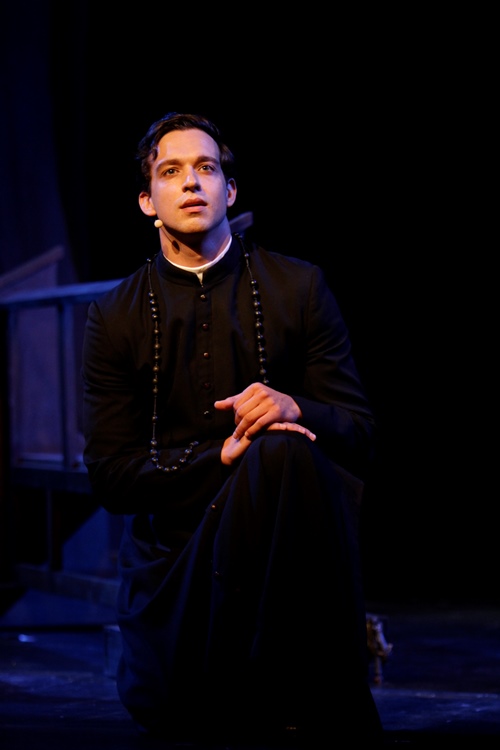 It is the initial form of the community which Kolping later sets up on a large scale and for which he will later go down in history. As the narrator, Kolping, as an old man, now tells the story of this decisive chapter of his biography, his life and his work.
It is the initial form of the community which Kolping later sets up on a large scale and for which he will later go down in history. As the narrator, Kolping, as an old man, now tells the story of this decisive chapter of his biography, his life and his work.
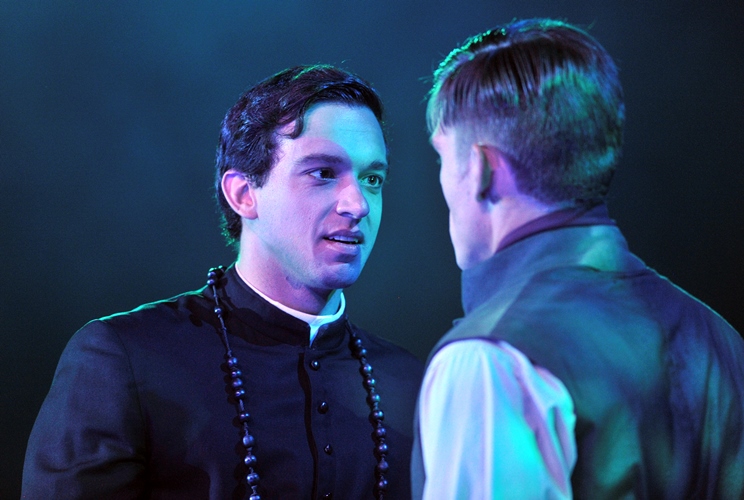 Kolping makes his way to Elberfeld’s slums. Cramped together the workers fight for mere survival. On his arrival Kolping is robbed. The leader of the gang is his old companion from his time in Cologne: Karl.
Kolping makes his way to Elberfeld’s slums. Cramped together the workers fight for mere survival. On his arrival Kolping is robbed. The leader of the gang is his old companion from his time in Cologne: Karl.
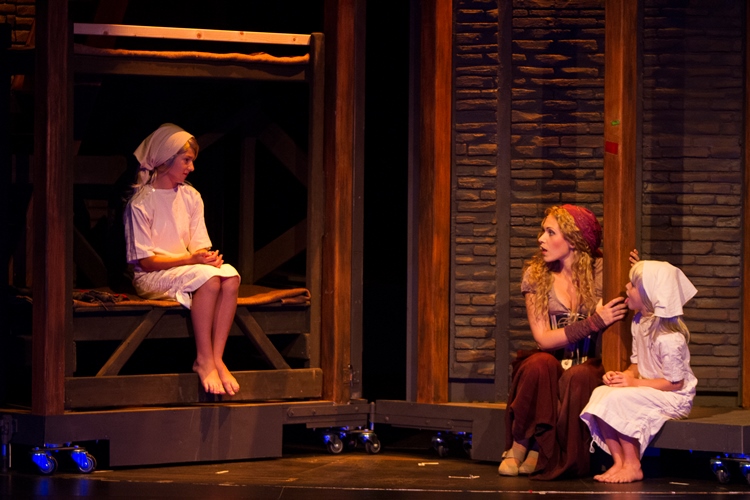 Karl takes Kolping back to his home where Susanne can hardly manage to feed their two daughters. When she hears of the attack she is furious and after a short, fierce argument, Karl leaves. Susanne explains Karl’s desperation: her first son died in Cologne because, due to Karl’s unemployment, the family could not afford a doctor. Kolping now realises why well-intended sermons from the pulpit are not sufficient to have any impact on the terrible living conditions which he now witnesses. He promises Susanne to do what he can for her.
Karl takes Kolping back to his home where Susanne can hardly manage to feed their two daughters. When she hears of the attack she is furious and after a short, fierce argument, Karl leaves. Susanne explains Karl’s desperation: her first son died in Cologne because, due to Karl’s unemployment, the family could not afford a doctor. Kolping now realises why well-intended sermons from the pulpit are not sufficient to have any impact on the terrible living conditions which he now witnesses. He promises Susanne to do what he can for her.
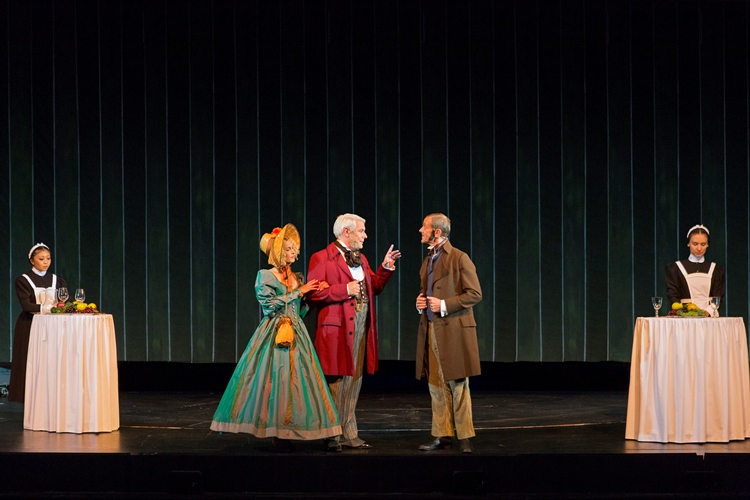 When Kolping is invited to dinner at Carnap’s,the mayor of Elberfeld, he tries to use the opportunity to bring up the topic of the appalling situation of the workers. The mayor has, however, an open ear for another guest, Karcher, the steel manufacturer and his new, young wife. Karcher has just negotiated the opening of a new steel factory in Elberfeld. Angered by what he has experienced in the Elberfeld slums, Kolping seeks a confrontation with the two influential men, but gets nowhere – the men feel strong in their position and Kolping’s criticism is like water off a duck’s back.
When Kolping is invited to dinner at Carnap’s,the mayor of Elberfeld, he tries to use the opportunity to bring up the topic of the appalling situation of the workers. The mayor has, however, an open ear for another guest, Karcher, the steel manufacturer and his new, young wife. Karcher has just negotiated the opening of a new steel factory in Elberfeld. Angered by what he has experienced in the Elberfeld slums, Kolping seeks a confrontation with the two influential men, but gets nowhere – the men feel strong in their position and Kolping’s criticism is like water off a duck’s back.
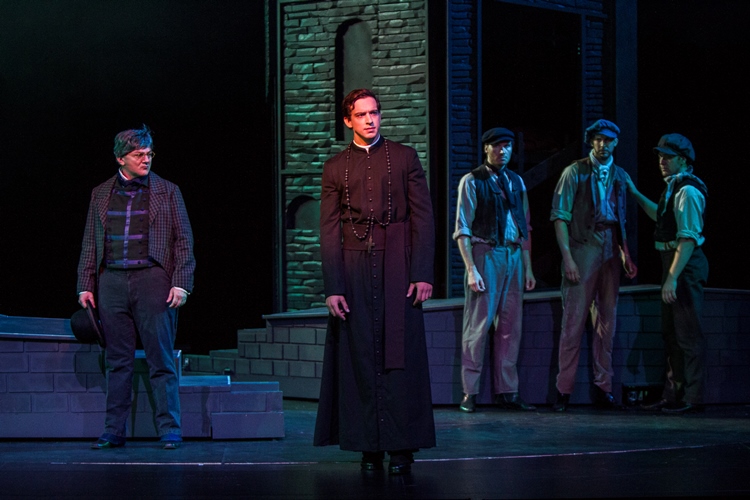 Kolping now fully supports Breuer’s concept for the journeymen’s association. Together with Breuer, Kolping aims to establish direct contact with the workers and finds many former journeymen who are now working in the factories. However, his appeal to them to return to their origins and to recognise the good sides of their work lives, falls on deaf ears. The young men are more inclined to revolutionary thoughts and reject Kolping’s efforts. Once again, he must hear Karl’s criticism that he is too remote from reality.
Kolping now fully supports Breuer’s concept for the journeymen’s association. Together with Breuer, Kolping aims to establish direct contact with the workers and finds many former journeymen who are now working in the factories. However, his appeal to them to return to their origins and to recognise the good sides of their work lives, falls on deaf ears. The young men are more inclined to revolutionary thoughts and reject Kolping’s efforts. Once again, he must hear Karl’s criticism that he is too remote from reality.
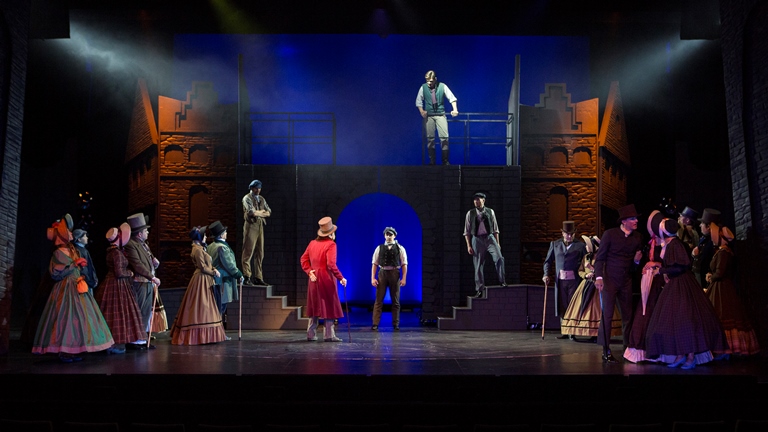 In the meantime, Karcher’s, the steel manufacturer’s, exploitation has borne rich fruits: at the opening of the railway line Elberfeld-Dortmund, for which he had the profitable order to deliver the tracks, he enjoys the acclaim as a man of progress, but Karl spoils his vain ego trip – Motivated by revenge for the dismissal in Cologne and its tragic consequences, Karl exposes Karcher’s schemes and shoots at him.
In the meantime, Karcher’s, the steel manufacturer’s, exploitation has borne rich fruits: at the opening of the railway line Elberfeld-Dortmund, for which he had the profitable order to deliver the tracks, he enjoys the acclaim as a man of progress, but Karl spoils his vain ego trip – Motivated by revenge for the dismissal in Cologne and its tragic consequences, Karl exposes Karcher’s schemes and shoots at him.
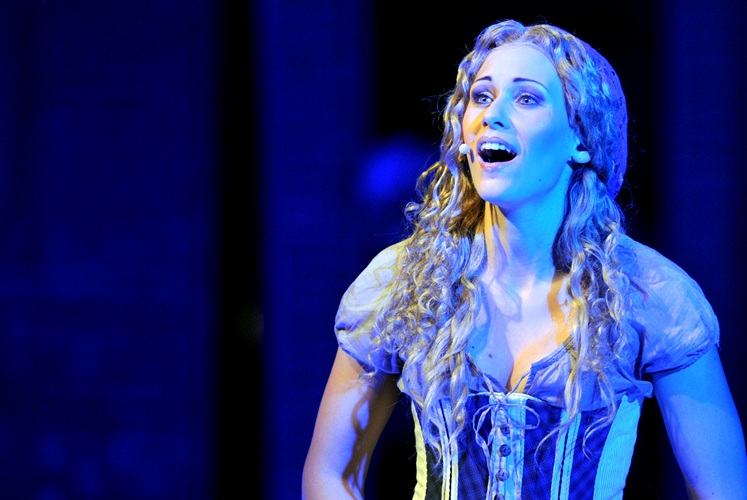 A revolutionary uprising now holds the city in its grip and the situation becomes critical. As a result of the shooting Karl must go underground. Kolping arranges a meeting between Susanne and Karl during which she stresses their love for each other and tries to persuade her husband to renounce violence, but Karl is convinced that he can turn the situation around.
A revolutionary uprising now holds the city in its grip and the situation becomes critical. As a result of the shooting Karl must go underground. Kolping arranges a meeting between Susanne and Karl during which she stresses their love for each other and tries to persuade her husband to renounce violence, but Karl is convinced that he can turn the situation around.
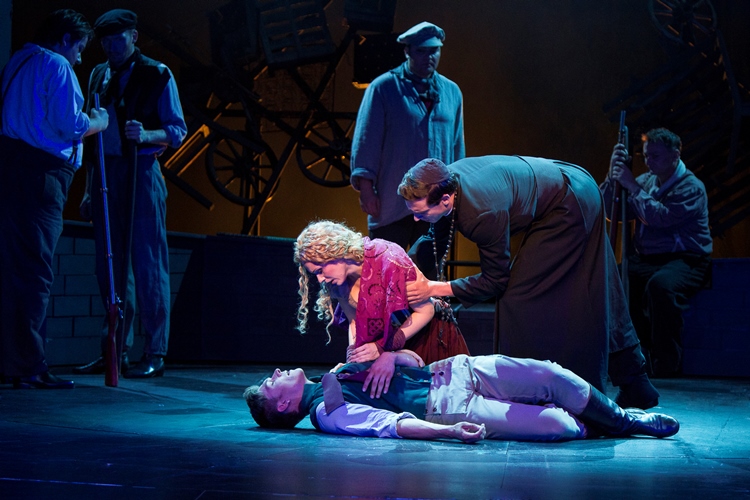 At the barricades Karl now mobilises a group of rebels who are absolutely no match for the approaching Prussian militia. Karl is wounded in the fighting and dies in Susanne’s arms. Susanne gets Kolping to promise that he will follow his convictions and thus give a sense to Karl’s death.
At the barricades Karl now mobilises a group of rebels who are absolutely no match for the approaching Prussian militia. Karl is wounded in the fighting and dies in Susanne’s arms. Susanne gets Kolping to promise that he will follow his convictions and thus give a sense to Karl’s death.
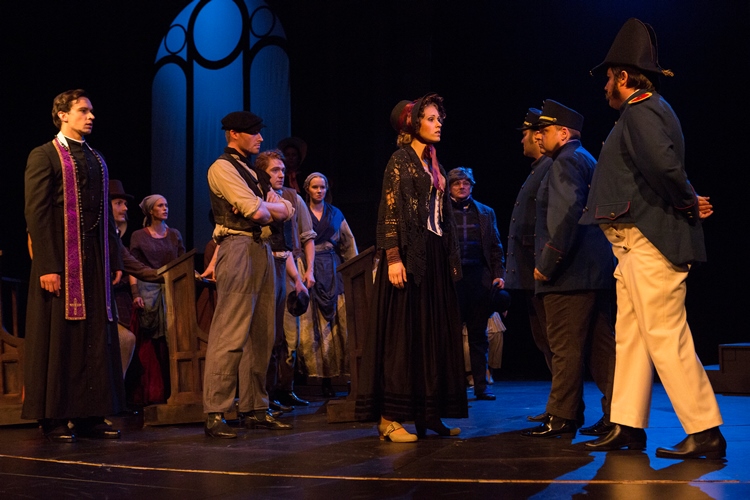 While Karcher and the mayor of Elberfeld, Carnap, are celebrating the victory over the rebels, Kolping breaks the decreed ban on public assemblies. Contrary to the regulations Kolping holds a funeral service for Karl. The church is completely full and the people now listen to the young chaplain’s vision of a better life. When the police want to break up the service, one by one the members of the congregation demonstrate their solidarity with Kolping.
While Karcher and the mayor of Elberfeld, Carnap, are celebrating the victory over the rebels, Kolping breaks the decreed ban on public assemblies. Contrary to the regulations Kolping holds a funeral service for Karl. The church is completely full and the people now listen to the young chaplain’s vision of a better life. When the police want to break up the service, one by one the members of the congregation demonstrate their solidarity with Kolping.
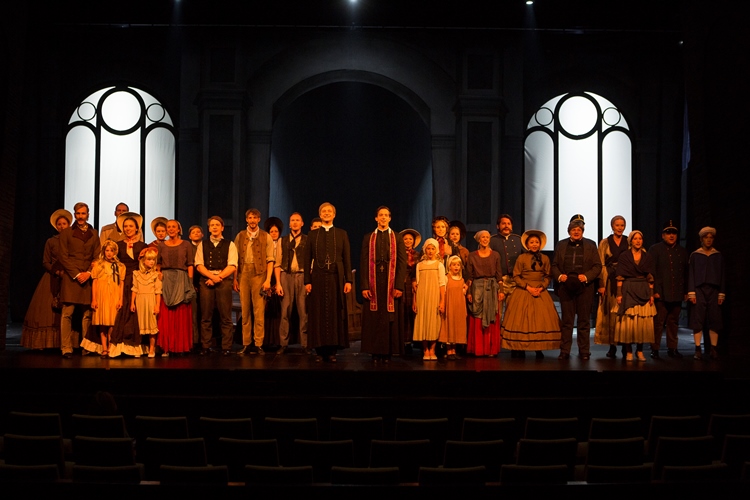 This is the foundation stone which is the basis for a strong community feeling and for the journeymen’s associations: Kolping’s dream.
This is the foundation stone which is the basis for a strong community feeling and for the journeymen’s associations: Kolping’s dream.


